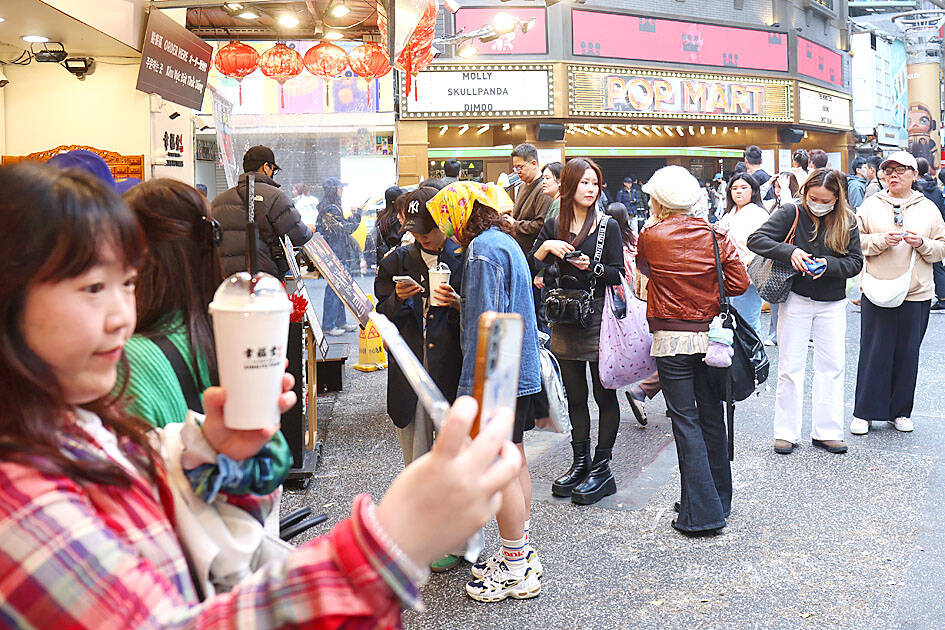The government’s business climate monitor last month turned “yellow-red” from “red,” indicating that Taiwan’s economy continued to expand, although some barometers slowed because of fewer working days, the National Development Council (NDC) said yesterday.
The composite score shed 4 points to 34, but both indices of leading indicators and coincident indicators moved up, affirming steady growth, the council said.
“The slowdown had much to do with the Lunar New Year holiday and the government is closely watching for any shift in economic trend,” NDC Department of Economic Development Deputy Director Chen Mei-chu (陳美菊) told a news conference.

Photo: CNA
The council uses a five-color spectrum to describe the nation’s economic state, with “red” signifying a boom, “green” indicating stable growth and “blue” suggesting sluggishness. A dual-color reading means the economy is shifting gears to a better or worse state.
The yellow-red signal came after exports gained momentum, but manufacturing sales, as well as wholesale and retail revenues, were subdued, the council said.
Tech firms remained busy to meet demand from global customers for electronics used in artificial intelligence (AI), but non-tech firms’ operations slowed in observance of the Lunar New Year after frontloading activity ahead of expectations of tariff hikes subsided, Chen said.
The index of leading indicators, which seeks to project the economic scene in the coming six months, increased 0.32 percent, up for a second straight month, as export orders, imports of semiconductor equipment and manufacturing business confidence displayed positive momentum, the council said.
Companies received more orders for information and communications technology products, as AI applications widened, which is favorable to exports, Chen said.
Likewise, the index of coincident indicators, which reflects the current economic situation, edged up 0.2 percent to 104.28, as industrial production, overtime hours and imports of machinery equipment improved from one month earlier, the council said.
In related developments, Taiwanese grew slightly more confident about spending this month, judging by an uptick of 0.05 points in the consumer confidence index to 72.59, a monthly survey by National Central University (NCU) released yesterday showed.
Specifically, people turn mildly more optimistic about Taiwan’s economic outlook, household income, the job market and purchases of durable goods, noticeably real estate, it found.
The positive-leaning sentiment came despite US President Donald Trump’s threat to impose tariffs on semiconductors, which bodes ill for Taiwanese chipmakers, NCU economics professor Dachrahn Wu (吳大任) said.
However, people expressed concern over the consumer price trend amid fears that the electricity prices might rise later this year after the legislature canceled a budget to aid lossmaking Taiwan Power Co (台電), Wu said.
Electricity price hikes would fuel inflation, he added.

SECTOR LEADER: TSMC can increase capacity by as much as 20 percent or more in the advanced node part of the foundry market by 2030, an analyst said Taiwan Semiconductor Manufacturing Co (TSMC, 台積電) is expected to lead its peers in the advanced 2-nanometer process technology, despite competition from Samsung Electronics Co and Intel Corp, TrendForce Corp analyst Joanne Chiao (喬安) said. TSMC’s sophisticated products and its large production scale are expected to allow the company to continue dominating the global 2-nanometer process market this year, Chiao said. The world’s largest contract chipmaker is scheduled to begin mass production of chips made on the 2-nanometer process in its Hsinchu fab in the second half of this year. It would also hold a ceremony on Monday next week to

TECH CLUSTER: The US company’s new office is in the Shalun Smart Green Energy Science City, a new AI industry base and cybersecurity hub in southern Taiwan US chip designer Advanced Micro Devices Inc (AMD) yesterday launched an office in Tainan’s Gueiren District (歸仁), marking a significant milestone in the development of southern Taiwan’s artificial intelligence (AI) industry, the Tainan City Government said in a statement. AMD Taiwan general manager Vincent Chern (陳民皓) presided over the opening ceremony for the company’s new office at the Shalun Smart Green Energy Science City (沙崙智慧綠能科學城), a new AI industry base and cybersecurity hub in southern Taiwan. Facilities in the new office include an information processing center, and a research and development (R&D) center, the Tainan Economic Development Bureau said. The Ministry

ADVERSARIES: The new list includes 11 entities in China and one in Taiwan, which is a local branch of Chinese cloud computing firm Inspur Group The US added dozens of entities to a trade blacklist on Tuesday, the US Department of Commerce said, in part to disrupt Beijing’s artificial intelligence (AI) and advanced computing capabilities. The action affects 80 entities from countries including China, the United Arab Emirates and Iran, with the commerce department citing their “activities contrary to US national security and foreign policy.” Those added to the “entity list” are restricted from obtaining US items and technologies without government authorization. “We will not allow adversaries to exploit American technology to bolster their own militaries and threaten American lives,” US Secretary of Commerce Howard Lutnick said. The entities

Minister of Finance Chuang Tsui-yun (莊翠雲) yesterday told lawmakers that she “would not speculate,” but a “response plan” has been prepared in case Taiwan is targeted by US President Donald Trump’s reciprocal tariffs, which are to be announced on Wednesday next week. The Trump administration, including US Secretary of the Treasury Scott Bessent, has said that much of the proposed reciprocal tariffs would focus on the 15 countries that have the highest trade surpluses with the US. Bessent has referred to those countries as the “dirty 15,” but has not named them. Last year, Taiwan’s US$73.9 billion trade surplus with the US